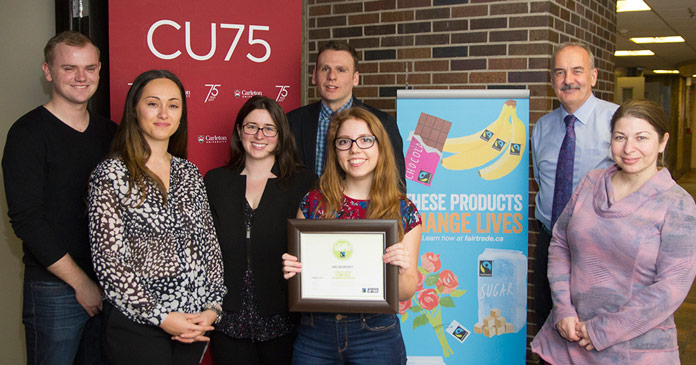By Clarissa Leir-Taha
Photos by Chris Strangemore
Carleton is the latest Canadian university to receive a Fair Trade Campus designation awarded by Fairtrade Canada.
In a move towards supporting fair and ethical conditions for global producers, all non-franchised campus locations and the university’s catering services are now selling fair trade coffee, tea and chocolate.
The university’s designation comes after a rigorous application process which saw students and administration coming together over the past year to ensure product availability and fair trade awareness around campus, a requirement set by Fairtrade Canada.
“It’s a huge milestone that should be celebrated,” said Mélissa Dubé, the Outreach Manager for Fairtrade Canada.
“By becoming a Fair Trade Campus, Carleton is making a statement in becoming a leader in social issues and social justice.”
Currently, only 21 other post-secondary institutions across Canada have been designated with the title, with Carleton becoming the 22nd.
“This designation is part of our ongoing commitment to continuous improvement in Dining Services and across campus,” said Ed Kane, assistant vice-president of University Services.

From left to right: Kenneth Boddy, Jane Skapinker, Melissa Dubé, Phil Mansfield, Ivy McKee, Ed Kane and Irena Knezevic
Desire for More Fair
Trade Options on Campus
He added that the decision to change Carleton’s purchasing policy was spurred on by student feedback indicating a desire to have more fair trade options available on campus.
After the initial spark to include more fair trade dining options, Dining Services in conjunction with student-organization Fair Trade Carleton and staff members, formed a 10-member committee that would oversee the application process.
In June 2016 the application was submitted to Fairtrade Canada for approval.
“We are excited to see this fantastic collaboration of students, Dining Services, CUSA and administration come to fruition as a response to our community’s strong belief and demand for social responsibility and using food as a vehicle to make responsible purchasing decisions,” said Jane Skapinker, Carleton’s registered dietitian with Dining Services.
Student input played a major role in working towards the approval of the initiative by encouraging the move towards supporting social justice at Carleton, said Kenneth Boddy, the former president of Fair Trade Carleton and a master’s student at the Norman Paterson School of International Affairs.
“Students have been drivers in terms of pushing the initiative forward and educating other students,” said Boddy.
Fair Trade: Supporting
Human Rights
Ivy McKee, a third-year student and current president of Fair Trade Carleton, echoed the importance of the student voice to the designation.
“Students want to know that the products they’re buying are not being exploitative,” said McKee.
“This designation means that Carleton as a university supports human rights around the world and fair sourcing practices.”
Organizers see the university’s newest title as only the first step in moving towards further social justice and sustainability practices.
“It’s also about asking: ‘What next?’” said Dubé. “What can the Carleton community do next in terms of sustainability and justice?”
After receiving a fair trade designation, campuses are encouraged to consider adopting fair trade purchasing policies around other foods, a step that Carleton could take in the future.
“It’s about culture change. It’s about changing the way that we consume and how we are educated,” said Dubé.
The designation was officially announced Feb. 15 at Carleton University.
Wednesday, March 8, 2017 in Environment and Sustainability, Human Rights, International
Share: Twitter, Facebook



